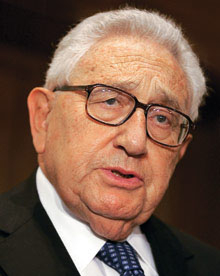
In September, Turkish President Abdullah Gul (left) accepted Armenian President Serzh Sarkisian’s invitation to attend a soccer match between their countries.
There are increasing hints that Turkey and Armenia could soon announce a deal reopening their border — which has been closed since 1993 — and restoring diplomatic relations.
Regional analyst Richard Giragosian, director of the Yerevan-based Armenian Center for National and International Studies, discusses the possibilities of such a deal with RFE/RL correspondent Charles Recknagel.
RFE/RL: You are one of an increasing number of regional analysts who see a forthcoming accord between Ankara and Yerevan. Why is that?
Richard Giragosian: We see broader developments that have moved both parties, Armenia and Turkey, much closer to forging a historic agreement. These broader trends include not only Russian support for such an initiative but we also see [that] the upcoming visit of U.S. President [Barack] Obama to Turkey [on April 6-7], the recent visit of Secretary of State Hillary Clinton to Turkey, and several months of secret negotiations and diplomatic negotiations between the Armenians and Turks in Switzerland have paved the way for a historic breakthrough agreement.
RFE/RL: There are some additional variables to consider that might increase pressure to reach agreement, including Obama’s campaign promise to support a Congressional resolution that would recognize as genocide the killings of Armenians in the Ottoman Empire in the period of World War I, and the upcoming Armenian Remembrance Day on April 24, which the White House traditionally marks with a statement. How soon do you think a Turkish-Armenian accord might be announced?
Giragosian: We see leaks of such a deal in the Turkish media and it seems both sides are now preparing their respective societies to brace for an announcement that possibly could come as early as April 16, when the Turkish foreign minister arrives in Armenia in the form of a meeting of the Black Sea Economic Cooperation organization.
However, I do not expect a breakthrough agreement to be unveiled during the April 16 meeting. It seems more likely that Turkey will decide to wait until after April 24 in order to exert maximum leverage over the Obama administration to refrain from recognizing the “Armenian Genocide” in his April 24 statement.
Thawing Relations
RFE/RL: If there is an announcement of an accord, what points might it include?
Giragosian: Several elements will be announced, starting with an agreement to open the long-closed border between Armenia and Turkey, followed by an agreement to move toward diplomatic relations, with the Turkish ambassador in Georgia most likely assuming the portfolio of representing Turkey in Armenia.
Third, we see an agreement as well to form a large, all-encompassing governmental commission to resolve several issues, most importantly including the “Armenian Genocide” issue. And fourthly, we do see signs of a possible Turkish unveiling of a new document or road map on Nagorno-Karabakh committing all sides to work within the OSCE Minsk Group mediation process and committing all sides to working hard to resolve the Nagorno-Karabakh conflict, which is the last frozen conflict in the region.
RFE/RL: How much opposition is there in Turkey and Armenia to an accord?
Giragosian: Once the agreement is announced publicly, this will invite confrontation with powerful vested interests. On the Turkish side, the vested interests which will oppose this will perhaps be a nationalist reaction against normalization. From the Armenian side, the Armenian government will have to deal with the Armenian diaspora, which has taken the lead role in terms of Armenian nationalism on this issue and the lead role in genocide-recognition efforts.
All Sides In Favor
RFE/RL: You are in Yerevan. What is motivating the Armenian government to pursue an accord at this time?
Giragosian: The timing is both ironic and inductive to normalization and an agreement, mainly because it is this Armenian government that is much less popular and much less legitimate than any previous Armenian government, making its desire for a foreign-policy success even more profound.
The Armenian government, embattled by a political internal stalemate, needs a foreign-policy success to distract international attention and divert it away from domestic shortcomings and also to endow it with a degree of legitimacy, which it lacks.
RFE/RL: And what about the Turkish side?
Giragosian: We also see, for the first time, that it is in Turkey’s national security interest to open the border, to stabilize the restive Kurdish regions of eastern Turkey, which, after the war in Iraq, is even a larger concern for Turkey.
RFE/RL: Finally, what is Russia’s position on a Turkish-Armenian accord? In the past, Moscow — which has strong ties with Yerevan — has been seen as against it. Has that changed?
Giragosian: The key difference here is that after the war in August [in South Ossetia between Russia and Georgia], the Russians are now supporting the process, unlike in the past, and in fact they are also looking to use open borders between Armenia and Turkey to their own economic benefit by virtue of their control over energy and telecommunications in Armenia, but also to further isolate and marginalize Georgia, which is in their strategic interest.
But despite the negative agenda I do think that, regardless of the motivations, that the end result is a net benefit for all sides.
https://www.rferl.org/a/Are_Turkey_And_Armenia_About_To_Normalize_Relations/1600894.html







